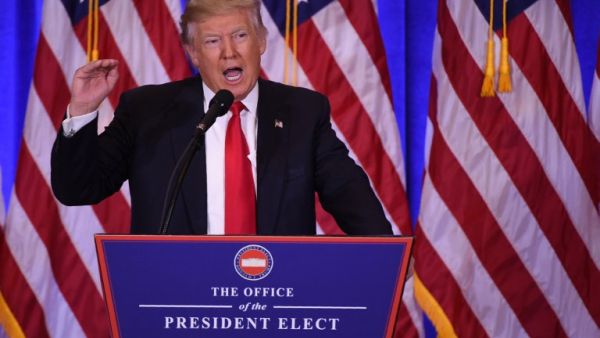- Twitter users have accused Trump of inciting hate
- He retweeted anti-Muslim videos from a far-right account
- Promoting violence or fear of a group contravenes Twitter's rules
- Trump has stopped trying to hide his Islamophobia, some suggest
by Rosie Alfatlawi
After the U.S. President retweeted anti-Muslim videos has his (barely) latent Islamophobia finally reared its ugly head for all to see, and should he be kicked off Twitter?
On Wednesday, the official personal account for Donald Trump retweeted three unverified clips from the deputy leader of far-right U.K. group Britain First.
The first was captioned “VIDEO: Muslim migrant beats up Dutch boy on crutches!” It showed a young man on crutches apparently being attacked by another.
A second video shared by @realDonaldTrump had previously been identified online as showing members of the Nusra Front, now known as Jabhat Fateh al-Sham, or Al-Qaeda in Syria. The two Arabic-speaking men throw a statue of the Virgin Mary to the ground, smashing it.
It is captioned: “VIDEO: Muslim Destroys a Statue of Virgin Mary!”
The third retweet was of footage showing individuals, including one carrying the ISIS flag, apparently throwing stones at men on a rooftop before throwing them off.
“VIDEO: Islamist mob pushes teenage boy off roof and beats him to death!” reads the caption.
The nature of the source for these videos, and the words accompanying them, place them within Islamophobic discourse.
- Trump Tweets Anti-Muslim Videos from British Far-Right Leader
- #IslamophobiaAtPolls goes viral as Trump wins election
Jayda Fransen, from whose account Trump retweeted, has a conviction for religiously aggravated harassment. She was found guilty earlier this month for verbally abusing a Muslim woman wearing hijab.
Pinned to the top of her Twitter account is a video of her marching holding a cross.
The tweet reads: “The Muslims of Luton claim they've taken our country from us! It seems my Christian cross really offends them!”
Rather than explain the context of the videos, Fransen’s wording instead emphasizes the supposed religion of the attacker in each case, making “Muslim” or “Islamist” the first word of the captions.
To identify a member of Nusra Front simply as a “Muslim” and brush off ISIS as an “Islamist mob,” if those are indeed the groups shown, is an insult to their many Muslim victims.
ISIS in particular has been branded a “takfiri” organization by some for its tendency to deem fellow Muslims apostates to justify attacks against them. Shia Muslims, gay Muslims and simply those opposed to ISIS have been systematically targeted by the group, including potentially in this clip.
The tweets are also a veiled threat in that they imply “this is what all Muslims are like.” Within the context of Britain First’s campaigning, videos like this are used to justify attempts to restrict their religious freedoms or worse.
“The president of the United States is systematically attacking an entire religion this morning based on the actions of random people,” replied @krassenstein.
All of this suggests that the tweets are hateful. But do they constitute hate in any punishable form?
According to Twitter’s “hateful conduct policy,” “you may not promote violence against or directly attack or threaten other people on the basis of ...religious affiliation”.
Many replies on the site suggested that Trump’s intention was to do exactly that.
“There is only one purpose to this video and it’s to incite violence against Muslims.” tweeted @TheLoveBel0w. “Stop inciting people” read another tweet, while @asoterakis described the videos as “hateful scare tactics.”
Inciting “fear about a protected group” is another behavior Twitter says it does not tolerate.
If it could ignore such content being shared by a marginal figure like Fransen on the grounds that it was not a direct threat, that should not be the case for Donald Trump.
One of the most powerful people in the world, with 43.6 million followers, Trump’s words can and do have an impact.
His campaign was cited as the key cause for the tripling in anti-Muslim hate groups during 2016, according to The Southern Poverty Law Center (SPLC). Islamophobic incidents in the U.S. rose 91 percent in the first half of 2017, the Council on American-Islamic Relations reported.
Of course, Trump’s actions as president have also had a direct impact on Muslims. His block on travel from a number of Muslim-majority nations was characterized by opponents as a “Muslim ban.”
One Muslim beats up one non Muslim and Trump uses it as an example for a travel ban. One white man uses a gun to kill 60 people and Trump is silent on gun control.
— Ed Krassenstein (@EdKrassen) November 29, 2017
The Trump administration meanwhile insisted it was a “travel ban,” denying it targeted Muslims in particular.
For many on Twitter, however, the latest retweets were a confirmation of Trump’s Islamophobia.
Omg Donald you have just re-tweeted a post from a far right wing racist group. You've now admitted you are a racist, well done
— Pamela Howlett (@Pammie1951) November 29, 2017
“Well at least you’re not pretending not to hate Muslims anymore,” replied @GregShugar.
Now that his Islamophobic scaremongering is out in the open, it is the perfect opportunity for Twitter to apply its rules and end the "hateful conduct" of President Trump, online at least.







